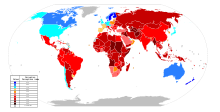- Corruption in Venezuela
-
Political corruption 
Corruption Perceptions Index, 2010Concepts Electoral fraud · Economics of corruption
Nepotism · Bribery · Cronyism · Slush fundCorruption by country Angola · Armenia · Canada
Chile · China (PRC) · Colombia
Cuba · Ghana · India · Iran · Kenya
Ireland · Nigeria · Pakistan
Paraguay · Philippines · Russia
South Africa · Ukraine · Venezuela
· United StatesCorruption in Venezuela, as with its surrounding countries, is high by world standards. In the case of Venezuela, the discovery of oil in the early twentieth century had worsened political corruption,[1] and by the late 1970s, the description of oil as "the Devil's excrement" had become a common expression.[2]
Corruption is difficult to measure reliably, but one well-known measure is the Corruption Perceptions Index, produced annually by the Berlin-based NGO, Transparency International (TNI). Venezuela has been one of the most corrupt countries in TNI surveys since they started in 1995, ranking 38th out of 41 that year[3] and performing similarly badly in following years (eg 158th out of 180 countries in 2008, the worst in Latin America except Haiti[4]).
Contents
1999 – present
In Gallup Poll's 2006 Corruption Index, Venezuela ranks 31st out of 101 countries according to how widespread the population perceive corruption as being in the government and in business. The index lists Venezuela as the second least corrupt nation in Latin America, behind Chile.[5]
In August 2006, following assaults on a squatter and a National Assembly member, El Universal says that Chávez called on the latest Minister, Jesse Chacón to quit if he could not do the job, demanding more rigor in the fight against corruption, and affirming the need to clean up and transform the local police forces. He questioned the impunity that exists in the country, and challenged authorities, like Chacón, to resign if they couldn't make progress against crime. He also called for greater protection of squatters settling on landed estates.[6]
Some criticism has come from Chávez's supporters. Chávez's own political party, Fifth Republic Movement (MVR), has been criticized as being riddled with the same cronyism, political patronage, and corruption that Chávez alleged were characteristic of the old "Fourth Republic" political parties. Venezuela's trade unionists and indigenous communities have participated in peaceful demonstrations intended to impel the government to speed up labor and land reforms. These communities, while largely expressing their sympathy and support for Chávez, criticize what they see as Chávez's slow progress in protecting their interests against managers and mining concerns, respectively.[7][8][9]
According to some sources Venezuela's corruption includes widespread corruption in the police force.[10]
In early 2009 President Hugo Chávez launched a new anti-corruption drive, having previously declared a "war against corruption". Early 2009 saw charges brought against a number of leading political figures, including Manuel Rosales (who fled to Peru), Raúl Baduel and Eduardo Manuitt. Nine ex-mayors were also charged.[11]
See also
References
- ^ From 1917, "greater awareness of the country's oil potential had the pernicious effect of increasing the corruption and intrigue amongst Gomez's family and entourage, the consequences of which would be felt up to 1935 – B. S. McBeth (2002), Juan Vicente Gómez and the Oil Companies in Venezuela, 1908–1935, Cambridge University Press, p17.
- ^ "The perception of petroleum as the cause of Venezuela's corruption had become widespread during this period." – Coronil, F. (1988), The magical state: nature, money, and modernity in Venezuela, p353
- ^ Transparency International, 15 July 1995, 1995 TI Corruption Index
- ^ Transparency International, 2008 Corruption Perceptions Index, accessed 30 June 2009
- ^ Steve Crabtree and Nicole Naurath Gallup Launches Worldwide Corruption Index Gallup Poll News Service Accessed 21 Dec 2006.
- ^ Diaz, Sara Carolina. Chávez exige acabar con latifundios. El Universal (7 August 2006).
- ^ Fuentes, F. (2005), "Challenges for Venezuela's Workers’ Movement". Green Left Weekly. Accessed 15 February 2006.
- ^ Márquez, H. (2005), [1] Inter Press Service. Accessed 2 February 2006.
- ^ Parma, A. Venezuela Analysis (2005a), "Pro-Chavez Union Leaders in Venezuela Urge Chavez to Do Better". Venezuela Analysis. Accessed 26 January 2006.
- ^ Reel, M. "Crime Brings Venezuelans Into Streets". Washington Post (10 May 2006), p. A17. Accessed 24 June 2006.
- ^ Venezuelanalysis, 5 May 2009, Venezuela Combats Crisis by Fighting Corruption, Bureaucracy
Further reading
- Gregory Wilpert (November/December 2006). "Corrupt Data". Extra!. http://www.fair.org/index.php?page=3431.
- Kiraz Janicke (18 June 2008). "Venezuela’s Electoral Council to Respect Disqualification of Candidates Accused of Corruption". Venezuela Analysis. http://venezuelanalysis.com/news/3570.
Corruption in Latin America and the Caribbean North America - Mexico

Central America - Belize · Costa Rica
- El Salvador
- Guatemala
- Honduras
- Nicaragua
- Panama
Caribbean - Antigua and Barbuda
- Bahamas
- Barbados
- Cuba
- Dominica
- Dominican Republic
- Grenada
- Haiti
- Jamaica
- Puerto Rico1
- St. Kitts and Nevis
- St. Lucia
- St. Vincent and the Grenadines
- Trinidad and Tobago
South America - Dependencies not included.
- 1 Defined as a semi-autonomous territory.
Categories:- Corruption by country
- Politics of Venezuela
- Crime in Venezuela
Wikimedia Foundation. 2010.
